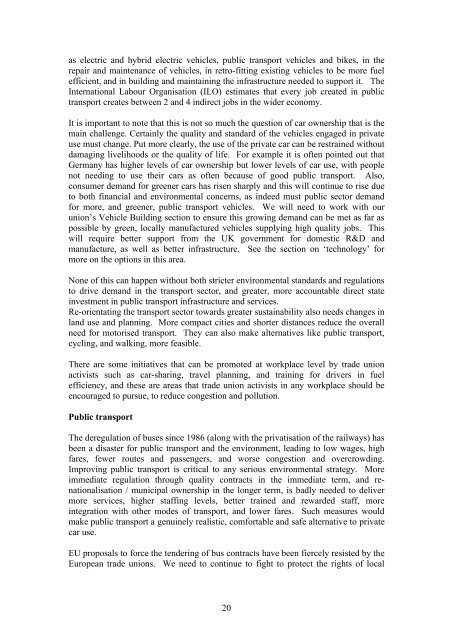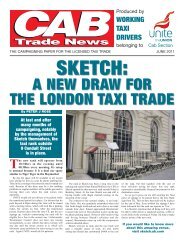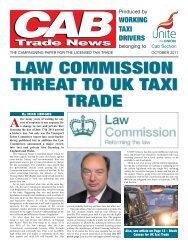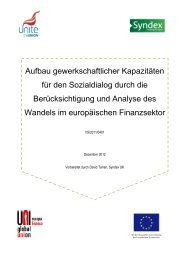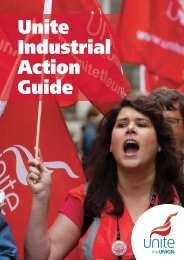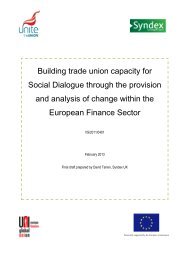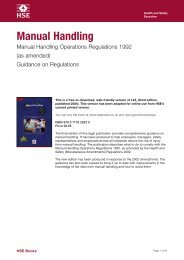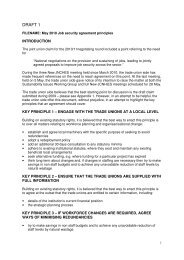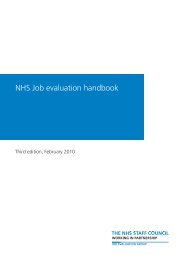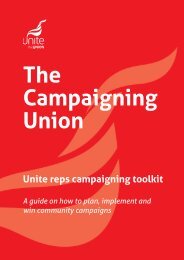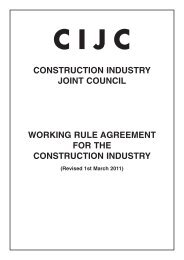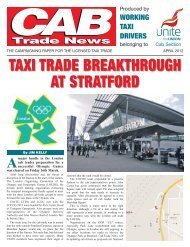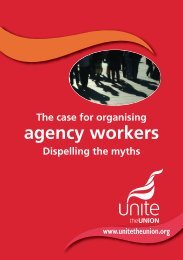Sustainable Transport and the Environment Guide - Unite the Union
Sustainable Transport and the Environment Guide - Unite the Union
Sustainable Transport and the Environment Guide - Unite the Union
Create successful ePaper yourself
Turn your PDF publications into a flip-book with our unique Google optimized e-Paper software.
as electric <strong>and</strong> hybrid electric vehicles, public transport vehicles <strong>and</strong> bikes, in <strong>the</strong><br />
repair <strong>and</strong> maintenance of vehicles, in retro-fitting existing vehicles to be more fuel<br />
efficient, <strong>and</strong> in building <strong>and</strong> maintaining <strong>the</strong> infrastructure needed to support it. The<br />
International Labour Organisation (ILO) estimates that every job created in public<br />
transport creates between 2 <strong>and</strong> 4 indirect jobs in <strong>the</strong> wider economy.<br />
It is important to note that this is not so much <strong>the</strong> question of car ownership that is <strong>the</strong><br />
main challenge. Certainly <strong>the</strong> quality <strong>and</strong> st<strong>and</strong>ard of <strong>the</strong> vehicles engaged in private<br />
use must change. Put more clearly, <strong>the</strong> use of <strong>the</strong> private car can be restrained without<br />
damaging livelihoods or <strong>the</strong> quality of life. For example it is often pointed out that<br />
Germany has higher levels of car ownership but lower levels of car use, with people<br />
not needing to use <strong>the</strong>ir cars as often because of good public transport. Also,<br />
consumer dem<strong>and</strong> for greener cars has risen sharply <strong>and</strong> this will continue to rise due<br />
to both financial <strong>and</strong> environmental concerns, as indeed must public sector dem<strong>and</strong><br />
for more, <strong>and</strong> greener, public transport vehicles. We will need to work with our<br />
union’s Vehicle Building section to ensure this growing dem<strong>and</strong> can be met as far as<br />
possible by green, locally manufactured vehicles supplying high quality jobs. This<br />
will require better support from <strong>the</strong> UK government for domestic R&D <strong>and</strong><br />
manufacture, as well as better infrastructure. See <strong>the</strong> section on ‘technology’ for<br />
more on <strong>the</strong> options in this area.<br />
None of this can happen without both stricter environmental st<strong>and</strong>ards <strong>and</strong> regulations<br />
to drive dem<strong>and</strong> in <strong>the</strong> transport sector, <strong>and</strong> greater, more accountable direct state<br />
investment in public transport infrastructure <strong>and</strong> services.<br />
Re-orientating <strong>the</strong> transport sector towards greater sustainability also needs changes in<br />
l<strong>and</strong> use <strong>and</strong> planning. More compact cities <strong>and</strong> shorter distances reduce <strong>the</strong> overall<br />
need for motorised transport. They can also make alternatives like public transport,<br />
cycling, <strong>and</strong> walking, more feasible.<br />
There are some initiatives that can be promoted at workplace level by trade union<br />
activists such as car-sharing, travel planning, <strong>and</strong> training for drivers in fuel<br />
efficiency, <strong>and</strong> <strong>the</strong>se are areas that trade union activists in any workplace should be<br />
encouraged to pursue, to reduce congestion <strong>and</strong> pollution.<br />
Public transport<br />
The deregulation of buses since 1986 (along with <strong>the</strong> privatisation of <strong>the</strong> railways) has<br />
been a disaster for public transport <strong>and</strong> <strong>the</strong> environment, leading to low wages, high<br />
fares, fewer routes <strong>and</strong> passengers, <strong>and</strong> worse congestion <strong>and</strong> overcrowding.<br />
Improving public transport is critical to any serious environmental strategy. More<br />
immediate regulation through quality contracts in <strong>the</strong> immediate term, <strong>and</strong> renationalisation<br />
/ municipal ownership in <strong>the</strong> longer term, is badly needed to deliver<br />
more services, higher staffing levels, better trained <strong>and</strong> rewarded staff, more<br />
integration with o<strong>the</strong>r modes of transport, <strong>and</strong> lower fares. Such measures would<br />
make public transport a genuinely realistic, comfortable <strong>and</strong> safe alternative to private<br />
car use.<br />
EU proposals to force <strong>the</strong> tendering of bus contracts have been fiercely resisted by <strong>the</strong><br />
European trade unions. We need to continue to fight to protect <strong>the</strong> rights of local<br />
20


